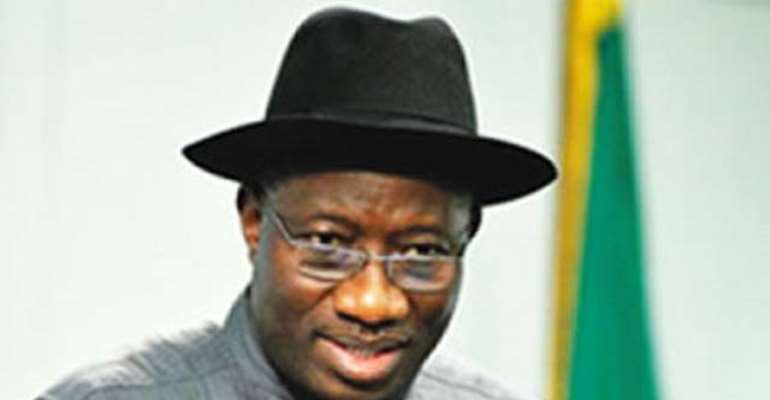Blame Nigerians for failure of anti-corruption war -Jonathan

To effectively curb corruption in Nigeria, all Nigerians must be committed to the fight against the monster, President Goodluck Jonathan said on Tuesday.
Jonathan blamed Nigerians for aiding and abetting corruption through their actions.
The President who spoke while declaring open the 54th annual conference of the Nigerian Economic Society (NSE), however, assured that his administration would continue to strengthen anti-corruption agencies in the country to strengthen the corruption fight.
He said that the fight against corruption was not what the government alone could win since it cuts across various facets of the national life and involves public and private institutions.
The President, however, said that he would not mention names for fear of being attacked but advised that Nigerians should stop creating an environment where people would continue to be tempted to take what belonged to the public and causing further hardships for millions of poor citizens in the country.
He said: 'We believe that we should not create an environment where people would be tempted to take what belongs to the public because that is why even in the fertiliser business we talk about electronic wallet so that funds are not exposed to corrupt people.
'When you talk about corruption, the private sector is involved; the public sector is involved; even the individuals including other societies and I wouldn't want to mention names so that I will not be attacked.
'But I know that if collectively all of us don't reward corruption, people would not be attracted to corrupt practices but when we all reward corruption, then of course we will be tempted to go in that direction.'
The President reassured that his administration would continue to focus on how to strengthen anti-corruption agencies to step up the fight against corruption.
He explained that the Federal Government's approach to fighting corruption was targeted at building institutions that had the capacity to overcome corrupt influences.
President Jonathan added that this approach would encourage anchoring the framework of the war against graft on the rule of law, adding that the efforts would empower the leaderships of the Economic and Financial Crimes Commission, EFCC, and the Independent Corrupt Practices and other Related Offences Commission, ICPC, to successfully implement the agencies' mandate.
He said: 'I want a society where all of us will frown upon people who come up with what they are not supposed to have. If a young man who just started a job and within six months or a year comes up with a car of N7m to N15m and you clap for him, then you are rewarding corruption.
'So for us as a nation, to bring corruption down in Nigeria, it is not just blaming government or blaming police but all individuals must frown upon people who have what they are not supposed to have, who live in houses they supposed not to live in; who drive cars they are not supposed to drive and who wear suits more expensive (than they earn).
'And until Nigerians are able to do this, then invariably we are all rewarding corruption and until we stop that, I don't think we will get to where we want to go.'
He disclosed that the anti-graft agencies have been repositioned to adopt more effective, efficient and transparent way of managing corruption and corrupt practices, while expressing regret that Nigerians, through their actions still reward corruption, by celebrating those who enriched themselves through dubious means, despite reforms aimed at fighting corrupt practices by government.
He said, 'We believe that we should not create an environment where people would be tempted to take what belongs to the public because that is why even in the fertiliser business we talk about electronic wallet so that funds are not exposed to corrupt people.
'When you talk about corruption, the private sector is involved; the public sector is involved; even the individuals including other societies and I wouldn't want to mention names so that I will not be attacked.
'But I know that if collectively all of us don't reward corruption, people would not be attracted to corrupt practices but when we all reward corruption, then of course we will be tempted to go in that direction.
'I want a society where all of us will frown upon people who come up with what they are not supposed to have.
'If a young man who just started a job and within six months or a year comes up with a car of N7 million to N15 million and you clap for him, then you are rewarding corruption.
'So for us as a nation to bring corruption down in Nigeria, it is not just blaming government or blaming police but all individuals must frown upon people who have what they are not supposed to have, who live in houses they are supposed not to live in; who drive cars they are not supposed to drive and who wear suits that are more expensive.
'And until us as Nigerians are able to do this, then invariably we are all rewarding corruption and until we stop that, I don't think we will get to where we want to go.
'Our efforts at strengthening the capacity of state institutions at fighting corruption is not limited to granting independence to EFCC and other anti-corruption agencies.
'It extends to developing affordable finance for housing, car ownership, etc as we believe that taking measures to help a realise aspirations to own their own homes and fund those things that make life easier can also aid the fight against corruption.
'In the area of management of government finances, for many years, the process has been manual-government officials carry documents and files from one office to another.
'This manual systems created opportunities for corrupt leakages and also introduced many ghost workers and ghost pensioners to the payrolls.
'Today, we have put in place modern computerized systems and processes to manage the government payroll and also the government finances.'
